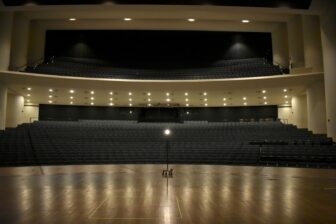By SOPHIA LADA
Capital News Service
LANSING — When a theater is empty, a single light bulb – known as a ghost light – is placed in the center of the stage to keep the theater from complete darkness.
Most theaters and other performing arts venues in Michigan have been empty for a year now.
One of them is the City Opera House, a 680-seat venue in downtown Traverse City.
“We’re lonely, we miss our patrons,” executive director Diana Baribeau said.
Its last event before the pandemic was March 10, 2020.
She said the organization lost more than $100,000 in rental income last year from what would have normally been renting out the venue for proms, weddings and memorial services.
Baribeau said the City Opera House laid off all but four employees by last July.
Previously, it had seven part-time employees specifically for events and more than 150 volunteers.
She is planning shows for the next season but they won’t start until October.
Assistance such as the Michigan Humanities Organizations Pandemic Emergency Grants have made a real difference, Baribeau said.
Shelly Hendrick Kasprzycki, the president and CEO of Michigan Humanities, said there were $700,000 in H.O.P.E. grants last summer from the federal Coronavirus Aid, Relief and Economic Security Act.
It awarded grants to 116 nonprofit cultural and community organizations in 53 counties.

The money was used to pay for salaries, rent and utilities.
Many arts and cultural organizations struggled last year, Kasprzycki said, but performing arts was one of the hardest-hit areas.
Michigan Humanities also receives funding from the National Endowment for the Humanities, the Michigan Council for Arts and Cultural Affairs and private donors.
She said many donors stepped up to support arts and cultural organizations during the pandemic.
Michigan Humanities is able to provide $1.5 million yearly in support for arts and cultural organizations.
Last year, it funded 799 events and 660 projects.
Many organizations successfully switched to virtual programming, Kaspryzcki said.
One of them is the Plowshares Theatre Co. in Detroit, Michigan’s only professional African American theater.
Gary Anderson, the producing artistic director, said it put on a 30-minute virtual performance and more than 10,000 people saw the video – more than have seen any single show at the company.
The video featured five songs from a new musical from the company.
The company received a H.O.P.E. grant.
Anderson said it went toward producing online programs to serve its audience.
During a normal season, the City Opera House hosts 15 to 25 national tours of performing arts that are planned a year in advance and hosts 260 to 280 events per year.
With the pandemic, there hasn’t been a normal season.
Baribeau said everything has been postponed at least three times now.
It was able to host a 25% capacity audience through part of the fall, but once COVID-19 cases went back up, it stopped.
Anderson said the pandemic has hit Black and brown communities harder than white communities, making it more difficult for Plowshares to reopen because it reaches predominantly Black and brown audiences.
To reopen, Anderson said, the space would need to be deep cleaned between performances, stage crew and actors would need to be tested and all people in the theater would need face masks.
Those would all be expenses the theatre didn’t have before, he said.
In addition, he said many of the online shows or movies people have watched to deal with the circumstances of the past year have been forms of art.
“If we don’t come out of this understanding that art is work and that art has value to the way we live our lives . . . then we have wasted the opportunity we have had these last twelve months,” Anderson said.